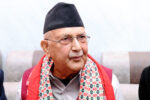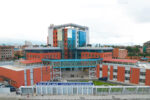CHITWAN: Medical doctors have advised mothers to avoid using mobile phones while breastfeeding their babies.
In an interaction organized by Kantipur Health Online in Bharatpur, marking World Breastfeeding Week today, they argued that using mobile phones during breastfeeding benefits neither the mother nor the baby.
Pediatrician Dr. Sweta Kumari Gupta of Bharatpur Hospital advised lactating mothers to stop using mobile phones during breastfeeding.
According to her, mobile phone use can divert mothers’ attention away from their babies.
“Mothers may remain unaware whether the baby has consumed enough milk if she uses a mobile phone while breastfeeding,” she said, adding that this could decrease the affection between mother and child.
Dr. Gupta emphasized the importance of touch and emotional engagement to boost early childhood development, advising mothers to snuggle and caress their babies while nursing.
She also highlighted the importance of proper posture for both mother and baby during breastfeeding.
Babies may need nothing except their mother’s milk for the first six months, she informed.
Regularly breastfed babies are less likely to suffer from pneumonia, diarrhea, and asthma, among other conditions, Dr. Gupta added.
She stressed that mother’s milk is crucial for the physical development of the child and suggested that mothers collect and store their milk if they need to work.
Mother’s milk can be used within 4 to 6 hours if kept at room temperature and within 24 hours if refrigerated.
However, she advised against directly heating refrigerated milk; instead, it should be warmed by placing the container in hot water.
Supplementary food can be introduced to babies after six months, she noted.
Dr. Gupta also suggested that hospitals allow mothers to feed their newborns directly, even those born through surgeries, to avoid the initial use of powdered milk.
This practice would benefit both mothers and newborns’ health.
Prof. Dr. Sunil Mani Pokharel, a gynecologist and Chief of the Department of Gynecology at Bharatpur Hospital, claimed that regular breastfeeding benefits both mothers and babies.
Breastfeeding for the first six months boosts the child’s health and physical development. He mentioned that breastfeeding 8 to 12 times a day is beneficial for babies.
Dr. Pokharel highlighted that mothers who breastfeed regularly have a lower risk of developing breast and ovarian cancer.
Breastfeeding also reduces bleeding in women and fosters love and affection between mother and child.
He noted a worrying trend of mothers avoiding breastfeeding for physical beauty, which adversely affects both the baby’s growth and the mother’s health.
He also shared that the number of people visiting Bharatpur Hospital for maternity services has decreased in recent years.
The hospital recorded over 9,000 maternity cases in the last fiscal year, compared to more than 12,000 in the previous fiscal year.
This decline is attributed to increased maternity services at village health clinics and the brain drain of youths.
Tilak Rimal, Chief Editor of Kantipur Health, stressed the need for widespread publicity about the importance of breastfeeding and creating a convenient environment for breastfeeding in offices.









Comment